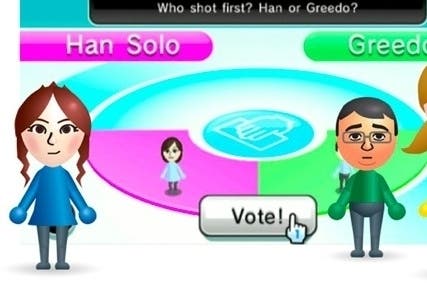Wiird Channels
Nintendo's waggle box and the goggle box.
You could have been forgiven for missing it, but last week a little piece of this console generation died. That's a term often thrown about thoughtlessly, but here it fits, with several of Nintendo's Wii Channels having made their final bows before disappearing forever.
So, farewell then: to the Everybody Votes channel, the Forecast and News channels, Check Mii Out and the Nintendo Channel. It's impossible to know figures, but one doubts that these services were used a great deal in 2013 - and in a world of tablet and smartphone functionality, things have somewhat moved on. Yet these Channels should not be buried without praise and, much more than that, an understanding of why such unassuming oddities existed at all.
Nintendo's history with online services is much longer than most people realise, and an interesting if minor point of comparison came almost exactly a decade before Wii - 1995's Satellaview add-on for the SNES. Consider the pack-in software, a cartridge called BS-X that had the appearance of a simple RPG, but was in fact the user interface for the Satellaview's various functions; that is, you walked around a little town and visited places to use different services. It is Nintendo trying to make internet services accessible in a way that made sense to a SNES audience. In other words, and this is an observation rather than a criticism, it is essentially insular.
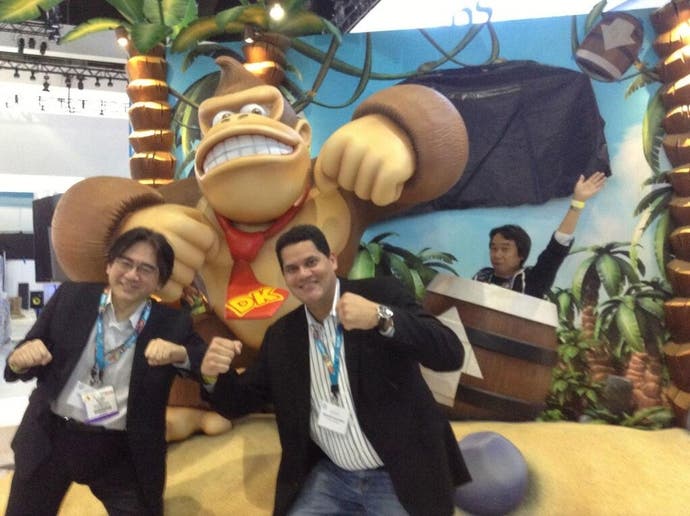
This is the aspect of Nintendo's Channel strategy that was exceptional. The Wii's online services are and were much maligned, but the specific criticisms tend to be true only for a traditional gaming audience - that is, the lack of online multiplayer. From any fresh perspective the Channels became a suite of surprising built-in software, halfway between games and applications, and they were a key part of the Wii's non-traditional character.
Let's look at how Everybody Votes was executed. The idea is simple: you're asked a question like 'Dogs or Cats?' When you select an answer your Mii dashes over to the appropriately highlighted area, and after a few days the results are downloaded, broken down by geography and gender. This seems so simple, but the way Nintendo introduces fun is ingenious. You answer questions twice. You have a personal answer, then guess at what the overall results would favour.
This is the type of touch that defines Nintendo's Channels, and it's so much deeper than it appears. The idea of taking other peoples' answers into account is a core principle of the Nash Equilibrium - that is, as everyone evaluates their answers in the context of what they think are likely answers elsewhere, some will make changes reflecting that. In other words, by asking a question two ways Nintendo adds a touch of meta-puzzling to Everybody Votes that makes the whole process more of a game. It's not about being profound; it's about being fun. Would you rather order pizza or Chinese food? And what do you think others will say?
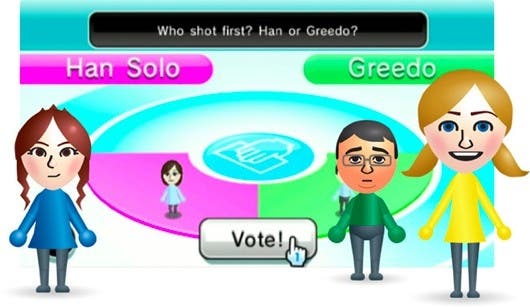
The questions on Everybody Votes did seem to be running out of steam by the end, but over its lifetime the channel was always a curiosity. We learned that 36% of respondents still watched movies on VHS. 75.5% of people never throw a pinch of salt over their shoulder after spilling some. 71.7% of people would turn back time if they could, and 81.2% of people cannot touch their nose with their tongue. (Losers!)
We're not going to go into such detail on every channel's function because many are self-explanatory, but it is worthwhile noting how modest and clear the purpose is for each. The News and Forecast channels received information while the Wii was sleeping, and the Nintendo channel was basically a dry run at Nintendo Direct. Note too how they work within the channels setup: the Forecast channel will show you if it's sunny or raining at a glance, with no need to load the thing itself unless you want more detailed information. News headlines slowly tick over.
Finally there's Check Mii Out, which was given the 100% less charming name of Mii Contest Channel in Europe, and perhaps that's why it never quite grabbed me like Everybody Votes - it was basically a way of sharing and voting on Miis, a community hub for designs.
This software is conceptually a million miles away from the PS3 and Xbox 360's nested menus and endless noise - and one could only take Microsoft's 'panels' revision to the 360 OS as an acknowledgement to that end. None of these individual channels seems particularly important in isolation; what matters is the overall impression they create.
'Something new every day.' Company president Satoru Iwata was convinced and insistent the Wii had to justify its 'WiiConnect24' functionality to every possible type of user, and within Nintendo the idea was given form in that phrase. You could quite easily call the Wii's Channels a radical online strategy, but really they're the tip of the iceberg as far as Nintendo's larger arc goes.
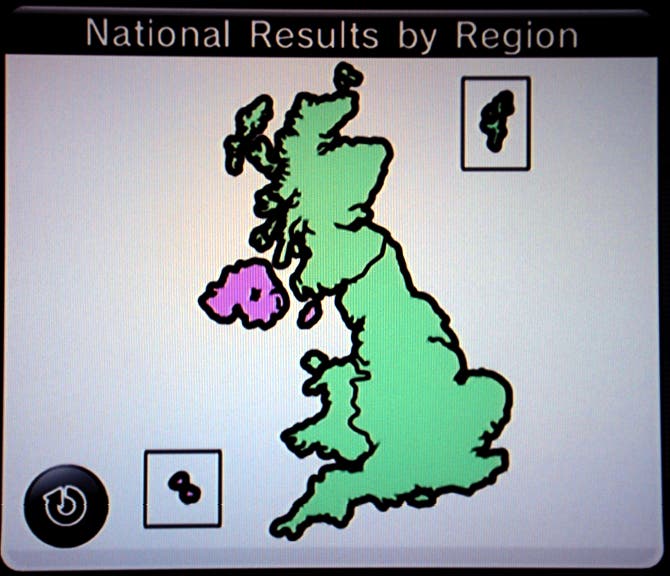
The Channels were not a part of the initial design - even after Nintendo had settled on the remote as Wii's controller. And the visual inspiration here is not home television but the window of an electronics store, a filmic cliché reimagined with softer edges. Something that is interesting simply to look at, as well as engage with, and that changes as if by magic.
This is an interpretation of the purpose of online that is not at its heart about multiplayer - which is why the wider industry is so scathing about it. The carefully-judged engagement with online of Wii was perhaps the most widely misunderstood and misrepresented thing about the console, an echo chamber based on fundamental assumptions that hold little water.
The journalist Osama Inoue wrote a book called Nintendo Magic, thoroughly recommended, in an attempt to catalogue the phenomenon of Wii. After much sober analysis he comes to the conclusion that Nintendo's philosophy of 'creating smiles' with their products is not just corporate bunk, but in fact why they've been able to consistently innovate in the field of video games since the 1970s - and recover from missteps.
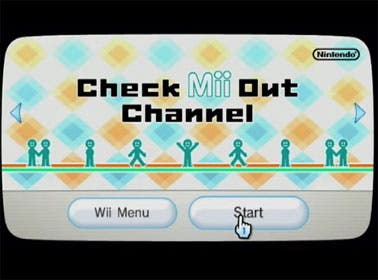
The idea of 'something new every day' is, in other words, a hard principle rather than a slogan. A commitment to surprise. You always have to be careful with terms like smile and surprise, much as Nintendo love to use them, because they're not firm things. Surprises can't be delineated and explained except after the fact; journalists can't preview them, analysts can't put them in projections. This fires the credulity of every person who thinks that Nintendo, this time, are surely destined for the scrapheap.
Surprises are the thing Nintendo's continuing survival depends upon, and they are unpredictable. Which leads to an overwhelming question, one that Inoue puts straight to the only man who could answer. "Don't you get tired of always trying to surprise people?" I imagine Shigeru Miyamoto's answer didn't miss a beat.
"No way."
But how far does one voice, even that of Miyamoto, carry in this cacophonous industry? Because Nintendo's surprises are small, we think they're unimportant.
It hardly matters. Things like the Wii's Channels matter and, as part of that console's overall concept, helped Nintendo completely wrong-foot both Microsoft and Sony in this current generation. It's worth remembering that. Say what you will about the Wii, but when it was on the shelves next to 360 and PS3 it did much more than hold its own.
Those consoles only ever served the converted. Nintendo decided long ago that, in its vision of the future, Everybody Votes.
